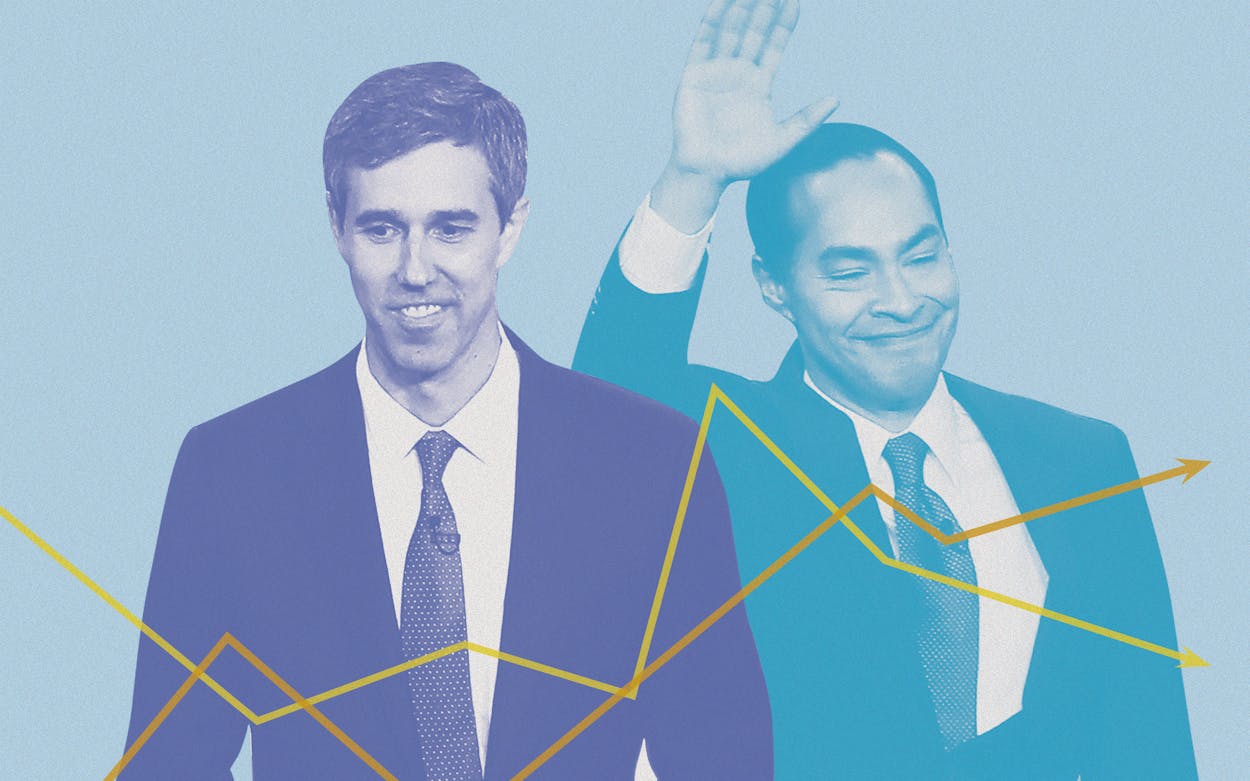On Sunday, the latest CBS/YouGov poll of the 2020 Democratic primary was released—and it included detailed polling of Texas, for the seventh time since late April. There are a few things worth tracking in that polling—Pete Buttigieg’s decline from 8 percent in the previous iteration of this poll to 4 percent in this one; Kamala Harris’s jump from 5 percent to 12 percent—but the most striking thing is that, despite struggling over the past month nationally, Beto O’Rourke remains a top-tier candidate in his home state.
O’Rourke’s polling nationally has been brutal for someone who entered the race with high expectations. A poll of New Hampshire last week had the former Senate candidate polling at 0.0 percent, and his fundraising numbers have been similarly dismal. In the key early state of Iowa, the same CBS/YouGov poll that looked at Texas had him at one percent. But here, it’s a different story: O’Rourke polls at a relatively impressive 17 percent, good for second in the field behind only Joe Biden (who currently polls at 27 percent among Texas Democrats). That’s 13 percentage points better than his average among early voting states, and it represents a few significant things for O’Rourke. One, it tells us that, despite a bad past month, his support in Texas didn’t take the same drubbing that it took nationally. Two, he has one important advantage over rivals like Buttigieg: an ability to actually win delegates.
We’ll look at what that actually means in a moment, but we should talk about Julián Castro first. Like O’Rourke, Castro’s numbers are virtually unchanged from previous polls, with the candidate polling at 4 percent. That’s better than his national numbers but it’s nonetheless bad news for him overall because it shows that his much-lauded performance in the first Democratic debate didn’t really improve his standing, even among the voters who likely know him best.
There are still six months until the first votes are cast, and if Castro continues to impress in debates, it might be enough to further establish him as a serious contender—but if he was counting on his first breakout to change his numbers, it hasn’t happened. The bottom line: The status quo is OK for O’Rourke, but pretty bad for Castro.
O’Rourke’s dismal numbers elsewhere, meanwhile, are less tragic for him if he’s doing well in Texas. The CBS/YouGov poll also projects which candidates would come away from Super Tuesday with delegates pledged to them, and it’s a short list. Of the twenty-plus candidates, only six—Biden, Harris, Bernie Sanders, Elizabeth Warren, O’Rourke, and Klobuchar—are projected to have delegates. Buttigieg and O’Rourke occupy roughly the same lane in the Democratic primary field, appealing primarily to young, white, moderate voters who like the idea of a Nice Young Man as president, and based on the way their fundraising prowess has flip-flopped since March, it’s clear that Buttigieg has dominated that space over the past several months. But while Buttigieg may poll better nationally than O’Rourke, only one of the two would actually claim any delegates by Super Tuesday, and it’s not the mayor of South Bend, Indiana.
Of course, a lot of candidates’ fortunes are likely to shift over the next six months or so. This is the time in presidential campaigning when most sane people are rightfully not paying a lot of attention, leaving the poll-intensive game theory to political wonks and journalists. (Hi!) Volatility is the norm this early on. Buttigieg was up during the spring, and is less relevant over the summer; Harris only began consistently polling in double digits in late June and July; Elizabeth Warren’s climb into the top tier has been slow and steady; Biden, who frequently polled above 30 percent in the late spring and early summer, is down several points now. But given that O’Rourke is largely irrelevant at the national level at this point, it’s hard to imagine that things could get worse for him over the next six months. His numbers in Texas have proved to be durable, even during a rough stretch. One can imagine that he’d be in a position to benefit, at least in Texas, if Biden faded from the top spot, or if Harris’s trajectory ends up being more like Buttigieg’s than Warren’s.
O’Rourke’s candidacy is a long shot at this point, and if his fundraising continues to dwindle, it gets even longer. But if he has a path to actually earning the nomination, it doesn’t run through Iowa, New Hampshire, South Carolina, or Nevada. Rather, it’s through Texas on Super Tuesday, where a significant slice of our 228 delegates—more than the four earliest-voting states combined—could catapult him back to relevance. For now, O’Rourke’s narrow path to the White House goes through Texas.
- More About:
- Politics & Policy
- Julian Castro
- Beto O'Rourke








